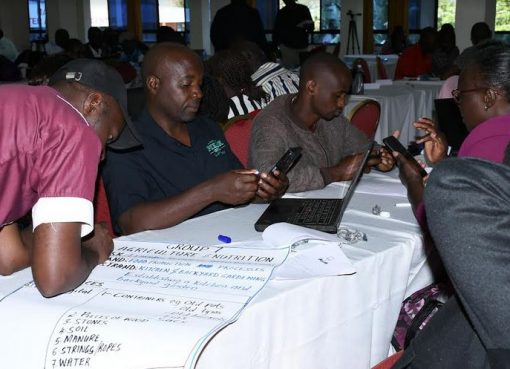Rose Nyambura had just completed her Journalism course at Egerton University and was on her final internship. She desperately needed a job to cushion herself and her family from economic shocks following the outbreak and spread of coronavirus pandemic.
Nyambura 22, who is set to graduate later this month in the first ever virtual ceremony that will be conducted by the University, says she was thrilled when she came across an online job opportunity at a local Television Station.
“At face-value, it was very attractive and I could not have been more thrilled. A number had been provided and on calling it, I was asked to send in my CV, KCSE details and a brief description of my person.
A few days later I received a phone call from a man who said I had been shortlisted for interviews. He requested me to attend the interview with a smart phone, a laptop, a notebook and pen,” she narrates.
Nyambura says that the caller requested she sends him Sh 5,000 so that ‘he may talk nicely to the bosses’ and speed up processing of Certificate of Good Conduct which she didn’t have.
Luckily for her before she could send the money and ‘proceed’ for the interview she met a friend just as desperate as her to land the job at the Television Station had been conned and robbed after responding to the online advert. When the friend (Identity withheld) ‘attended’ the interview he not only lost his money but his smart phone as well!
In Nakuru, con artists taking advantage of economic slowdown caused by Covid-19 pandemic have upped their game on posters, social media and bogus websites milking thousands of shillings from unsuspecting youth seeking ghost jobs and sometimes robbing valuables from those who physically ‘present themselves for the interview’.
A keen glance at electricity posts and walls at virtually all residential estates in Nakuru reveals hundreds of notices and advertisements for jobs promising ‘prospective employees’ attractive remuneration packages, commissions and allowances and privileges such as company vehicles and annual bonuses.
Within the Central Business District some of these fraudsters have developed thick skin and are placing ‘job vacancy’ advertisements in glass sealed notice boards inside some of the busiest and reputable high-rise commercial buildings.
The occupations range from plum jobs in Non-Governmental Organisations, private education and health institutions, law firms, companies and hotels and tour companies.
The bogus employment agencies use sophisticated graphics, captivating fonts and ‘seductive’ and persuasive terms leaving contacts in form of telephone numbers and e-mail addresses for interested parties to reach the companies and individuals behind the advertisements.
The low end segment has not been spared by the fraudsters as notices detailing individuals and ‘job agencies’ looking for house helps, shamba boys, watchmen, cooks and drivers in leafy suburbs have also surfaced in most estates.
Simon Muchile, a driver says he woke up one morning to try his luck on an advertisement pinned on an electricity post in the sprawling Kaptembwa Estate in April this year.
“I had just lost my job after a manufacturing company I was working for scaled down operations following the outbreak of Covid-19. When I spotted the advert that morning by a recruitment agency looking for truck drivers for a ‘prominent’ businessman based in Milimani Estate I felt lucky. I had all the qualifications they required,” narrates Muchile.
Without hesitation, Muchile called the phone number which was given and directed where to drop his CV that afternoon.
“I was directed to a very old building within Kenyatta Avenue where I was met on the ground floor by a decently dressed and smooth talking lady. She ushered me to seat next to a security guard before disappearing behind a flight of stairs.
Within ten minutes I received a call from the same lady who told me to wait as I had been successful and would start work the next day. I was overjoyed. When the youthful and charming lady in her mid-20s came back she asked me to ‘deposit’ Sh 6,000 with the ‘recruitment agency for uniform and Sh 2,000 for ‘their services’. I did not have the money so I made frantic calls to friends and relatives who topped up the amount”.
Muchile explains that the lady once again ascended the flight of stairs after receiving the money and that is the last he heard from her. His money was gone. The ‘recruitment agency’s’ phone number was unreachable!
“On enquiring from the security guard about the ‘recruitment agency’s exact location in the building, the mean looking sentry growled that I should not drag him into matters that least concern him and that he did not know the dealings I had with the lady. In fact he asked me to leave. I did not report the case knowing it was my fault,” he regrets.
So bold are the scammers that early this week when the County Government of Nakuru announced internal vacancies for promotion of medical specialists to occupy over 800 posts in 73 sections within health department the fraudsters infiltrated the system and started demanding money from shortlisted candidates via emails and phone calls.
“We have received information that unscrupulous people are calling applicants shortlisted for various positions in the health department asking for money to secure positions. We notify the public to beware of these con artists. We do not condone corruption,” a public notice issued by County Executive Committee Member for Health Dr Zachary Gichuki Kariuki reads in part.
He said con artists have upped their game even on social media platforms and asked health workers shortlisted for the interviews not to send money to individuals and instead report such requests to authorities.
Another victim, Mr Dennis Mabeta says he had high hopes of landing a job as an accounts assistant at a leading automotive body fabricating firm in Nakuru’s Industrial area when he came across a job advertisement notice in Langa-Langa Estate.
“I even encouraged my friend to apply for the job as they had ‘16 vacant posts’ for accounts assistants. We never saw anything fishy or read mischief and made our job applications through an e-mail address that had been provided,” explains Dennis.
Upon application, Dennis and his friend whom he prefers remains anonymous received a call from a man who identified himself as ‘manager’ and directed them to deposit Sh7, 000 each if they needed the job.
“Desperate to land ourselves jobs in the current hard economic times we complied. My friend borrowed the money from his father while I was lent the amount by a shylock,” says Dennis.
The ‘manager’ was unreachable on his cell phone the moment the money landed in his account. Two months on, Dennis sells facemasks in Kivumbini Estate while his friend now relies on not so easy to come by menial jobs.
In a bid to track those behind the bogus job scams Kenya News Agency bumped into an advertisement at a wall in Lanet Trading Centre looking for 80 salesmen to work in major bakery company in Industrial area. Below it was an enormous Sh 30,000 as starting salary, hefty travel and accommodation allowances and a pledge to provide successful applicants with company vehicles.
On dialing the number to inquire about the jobs, the recipient on the other side said that the ‘human resource manager’ was to be ‘appeased’ with Sh 10,000. When we visited the bakery the management informed us that as a matter of fact they were cutting down the workforce and had not advertised for any jobs.
The phone was disconnected immediately and has since become permanently unreachable after the bakery’s management attempted to contact the bogus human resource manager.
Our investigations have also established that the fake job scammers also target ladies looking for work as house helps only to end up in the arms of people not interested in their services but their bodies.
“What we advise the public is that they should be cautious when it comes to job applications one comes across on street notice boards,” a senior police officer responded when reached for comment.
The warning is among the many issued by various organisations to the public against fraudsters offering fake opportunities.
The Public Service Commission has on several occasions come out to deny bogus job advertisement circulating on social media.
Big corporate entities have also not been spared by fraudsters who have been fleecing desperate job seekers of their money purporting to offer them employment opportunities.
In January this year The Directorate of Criminal Investigations (DCI) expressed concern over growing number of online fraudsters who have been conning Kenyans.
Through their twitter account, the DCI asked job seekers to beware of fraudsters who pose as employers to defraud desperate Kenyans.
They explained that online fraudsters use emails to offer jobs in exchange for money and stated that the emails should be taken as spam.
“Beware of the emails, which offer jobs in exchange for money, such e-mails are spam. No organisation/ company ever ask for money to work for them,” warned the DCI.
By Anne Mwale





